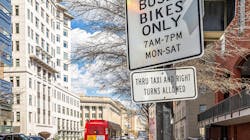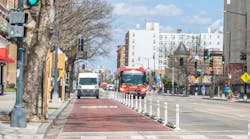WMATA and DDOT start 45-day minimum warning period for Clear Lanes program
The Washington Metropolitan Area Transit Authority (WMATA) and the District Department of Transportation (DDOT) have started the 45-day minimum warning period for the Clear Lanes program. The goal of the program is to improve bus speeds and reliability. Parked cars and vehicles illegally using dedicated bus lanes and bus stop zones slow buses down and impedes customer safety.
Under the program, cameras mounted on Metrobuses will capture video and photos of vehicles illegally operating, parking, standing or stopping in dedicated bus lanes and bus zones. All enforcement will be handled by DDOT. WMATA will not have any role in ticketing and enforcement.
“Keeping our bus lanes and bus stop zones clear of traffic is a significant step to creating a better bus experience for our customers,” said WMATA General Manager and CEO Randy Clarke. “By partnering with the District, we are helping to keep customers moving safely and reliably while positioning Metrobus as one of the most sustainable and most cost-efficient ways to travel in DC.”
WMATA has installed cameras on 140 buses, on 31 routes that run along bus only lanes in the district. The cameras will capture violators and then wirelessly transmit the encrypted videos and photos directly to DDOT for review and enforcement.
“Parking in a bus stop zone for even a minute can prevent the bus from being able to fully pull up to the curb, impacting the ability for bus riders using wheelchairs or mobility devices to board the bus,” said DDOT Director Everett Lott. “Keeping our bus lanes and bus zones clear and safe for buses will improve the accessibility and efficiency of our transit network.”
The initiative is similar to other programs in San Francisco and New York City and will be the first to use automated camera enforcement for bus stop zones. During the warning period, violators will not be fined. Full enforcement is expected to begin on Sept. 18.
The Clear Lanes program is part of WMATA’s Better Bus Initiative to improve bus service throughout the region and make bus a mode of choice for customers. In the district, where a majority of Metrobus customers do not own cars, the program is expected to improve service for more than 60 percent of Washington, D.C., bus customers.





